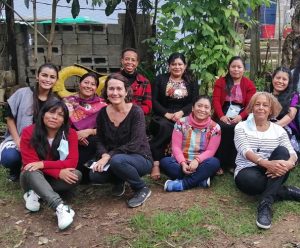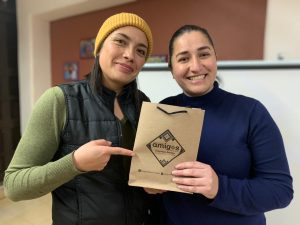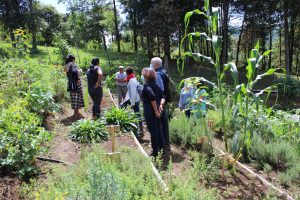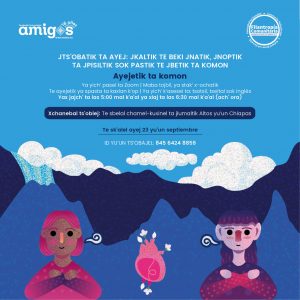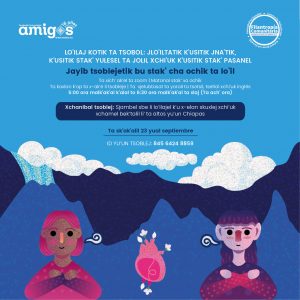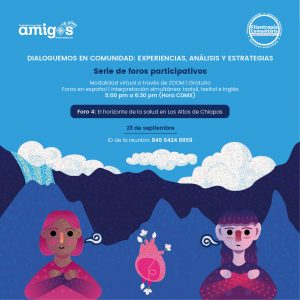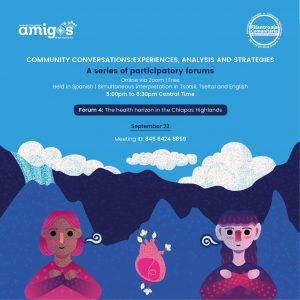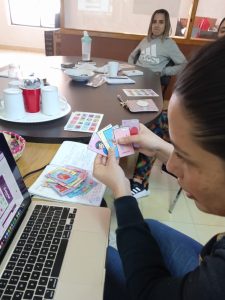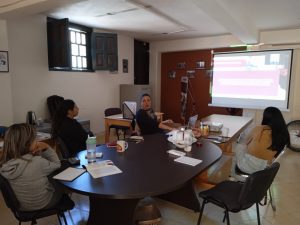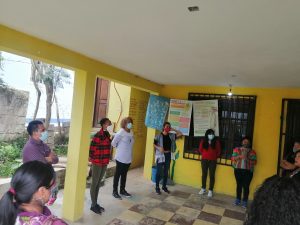“Changing our relationships in and with the community” – how Amigos de San Cristóbal is redefining its role in the Highlands of Chiapas
28 Apr 2023
What does it look like when an organization redefines itself, and the way it engages in and with the communities that it aims to serve – when issues around inclusivity, power and justice are moved to the forefront and initial approaches no longer seem fit for purpose? What are some of the challenges that come along with making this shift and, ultimately, is all the hard work and effort worth it? The GFCF spoke with Silvia Sántiz Méndez – Coordinator of the Community Philanthropy Program and of the Giving Circle of Native Peoples, Viridiana Dominguez Moreno – Coordinator of La Semilla Giving Circle and Co-coordinator of Fundraising, and Corinne Pierre-Louis – Operational Director, of Amigos de San Cristóbal A.C. (with excellent translation support provided by Minerva Zamora of Comunalia!) to hear more about the organization’s journey in recent years.
What the following story of Amigos de San Cristóbal highlights is that change is possible. For any organization questioning its role in promoting people-led development, its efficacy, its relevance or the local power dynamics at play: the following reading is for you.
The journey so far
Since its founding in 2005, Amigos de San Cristóbal has been committed to supporting vulnerable populations in San Cristóbal de Las Casas (the largest urban centre in the region) and across the Highlands of Chiapas in the south of Mexico. The region has historically faced issues of inequality, racism and discrimination. Despite being rich in natural resources, Chiapas is the poorest state in Mexico with high levels of poverty. Poor management of natural assets, extractive processes and over-exploitation have led to serious environmental challenges in the region, while the COVID-19 pandemic exacerbated existing economic and social issues.
Amigos de San Cristóbal initially conceived its role as a bridge, channelling external resources to local civil society organizations working in the fields of education, health and the environment. Though it was not originally a community foundation by name or structure, its spirit and approach shared some similarities with other organizations that might define themselves using the term. In 2018, with support from the W.K. Kellogg Foundation, Amigos de San Cristóbal took the decision to formally reorient its work as a community foundation, and in 2020 it launched a specific community philanthropy programme.
Community philanthropy in the Highlands of Chiapas
The aim of the programme is to more meaningfully involve rural and urban communities from across the region in creating positive social change, emphasizing the role that local resources can play in contributing to this. With the launch of the programme, the foundation also more clearly articulated its commitment to social justice and anti-racism. This reorientation means that, in addition to channelling external resources to the region, Amigos de San Cristóbal also sees one of its key roles as being a mobilizer and amplifier of local resources, and as a connector and supporter of social change agents in the Highlands of Chiapas. It feels that its new structure as a community foundation – with an increased focus on community identified-priorities and the local, diverse assets that exist to address them – is fundamentally changing the nature of its relationships with communities across the Highlands of Chiapas.
The starting point for the community philanthropy programme was to interrogate the very idea of who is a “philanthropist.” A core belief of Amigos de San Cristóbal is that, despite past injustices faced and ones’ “place” in the community, everyone has something to contribute. With this new programme, Amigos de San Cristóbal is aiming to shift the understanding of “philanthropy” away from something done by wealthy people in faraway places to something more participatory and community-based in nature. It embraces a broad understanding of what philanthropic resources entail, describing these as “the four T’s: treasure, time, talent and testimony.”
“Intentionally inclusive” Giving Circles
In a 2021 interview with the GFCF, Tatiana Fraga Diez, the Executive Director of Comunalia commented that: “I find the work of Amigos de San Cristóbal around Giving Circles to be really exciting, as it is so intentionally inclusive…They use these Circles as a method to fundraise but, more than that, to bring communities together and make new connections.” These local Giving Circles are one of the main tools used by Amigos de San Cristóbal to build community philanthropy in the region, and are a vehicle through which communities can pool their “four T’s.” Inclusivity, shifting power and participation were key values embedded in the Giving Circles as they launched in 2020.
When Amigos de San Cristóbal reviewed the Spanish translation of the GFCF’s 2021 paper on Giving Circles, “Sister, brother – or just someone who cares”: How Giving Circles celebrate the power of giving and reclaim what it means to be a donor they insisted that this refer to “Círculos de Dar” rather than “Círculo de Donación” as had been originally suggested. “Dar” (giving) implies a recognition of more diverse forms of assets while “Donación” (donation) can imply a charitable, transactional one-way action – precisely the traditional understanding of philanthropy that they are trying to move away from. Language used to explain the purpose and goals of the Amigos de San Cristóbal’s Giving Circles directly addresses issues of power, and aims to challenge the social, political and economic norms imposed by cultural hegemony. The Giving Circles themselves undermine this status quo, being based on the premise that everyone, including the most vulnerable and marginalized, has something to offer.
Aiming to be as inclusive as possible, all communications around the Giving Circles programme are available in four languages: Tseltal, Tsotsil, Spanish and English. The inclusion of Tseltal and Tsotsil – local indigenous languages – is especially significant as this encourages participation from these communities that have traditionally been particularly marginalized. Giving Circles gatherings themselves are also conducted in multiple language, as Amigos de San Cristóbal is committed to diversity and linguistic access. Work with indigenous groups in particular has intentionally sought to tap into ancestral practices of giving, solidarity and reciprocity, recognizing that these concepts are already deeply woven into the fabric of indigenous communities. In the Tseltal and Tsotsil languages it is referred to as “komon at’el” (collaborative work).
Adapting along the way
While charting this new path, Amigos de San Cristóbal is fine-tuning its approach along the way based on what it is learning. Initially, six Giving Circles representing the diversity of the San Cristóbal community were launched. Four were composed of people living in the Highlands of Chiapas: national San Cristóbal residents, San Cristóbal residents from different parts of the world, as well as Tseltal and Tsotsil people. The fifth Giving Circle was made up of people from different states of Mexico, and finally there was one made up of people living abroad who had ties to the region. After initial experimentation with the six Giving Circles, and in the spirit of making connections across diverse parts of the community, Amigos de San Cristóbal took the decision to re-orient the programme around just two larger Circles. These are formed around where people are based, rather than other distinctions. One convenes indigenous groups, while the other brings together residents along with local businesses “intent on questioning their own privileges.” For now, so as not to spread the foundation too thin, the focus is on engaging those living in the Highlands of Chiapas rather than those outside of the region.
Amigos de San Cristóbal is also adapting itself as an organization to ensure that it is appropriately structured to play its new role in the community. The 2020 community philanthropy initiative saw the organization implementing a programme of work itself for the first time. This required a mind-set shift from board and staff. While Amigos de San Cristóbal continues to channel external funding to the region, the launch of the Giving Circles in particular necessitated that the foundation build different kinds of relationships with the people living in the Highlands of Chiapas, and to interrogate what a community-led programme really looks and feels like. At the community-level, a number of local actors, accustomed to being recipients of more charitable-based ways of working as well as the broader welfare state context, also required time to understand this shift in approach. Not least of all, to recognize the strength and power of their own assets. Practically, Amigos de San Cristóbal also had to adopt new administrative processes as its role evolved and local resources began to be channelled through the foundation. One example was that procedures around the issuance of tax deductible receipts needed to be understood and applied.
As will be a familiar refrain to many organizations, COVID-19 also threw up an unexpected set of challenges for Amigos de San Cristóbal. The pandemic hit just as the organization was in the process of launching the community philanthropy programme. Delicate work around trust and relationship building became all the more complex, and needed to be re-approached, as the initial Giving Circles convenings moved online.
The road ahead: Everyone is a philanthropist
While this effort to redefine itself and how it engages with communities is still a work in progress, Amigos de San Cristóbal believes that its efforts to shift traditional notions around philanthropy in the Highlands of Chiapas are well worth it. The foundation is confident that they – working alongside committed, involved and invested individuals – are creating a solid basis from which social change in the Highlands of Chiapas can be realized. Those involved in the Giving Circles are viewing themselves differently as well: no longer as passive recipients of charity but as local change-makers in their own right.
Thinking about its own future, Amigos de San Cristóbal hopes that even more people living in the Highlands of Chiapas will see it as a space for channelling philanthropic efforts: a transparent, inclusive and effective partner, committed to dignifying the lives of those suffering from injustice. It hopes to continue collaborating with those that have already made this shift and see themselves as givers and as part of the Amigos de San Cristóbal’s family, but it is also committed to broadening this family of “philanthropists.” Common feedback from Giving Circles members refers to the gratification and satisfaction they take from their involvement. Amigos de San Cristóbal sees its new role as spreading this “light” to others.


